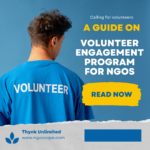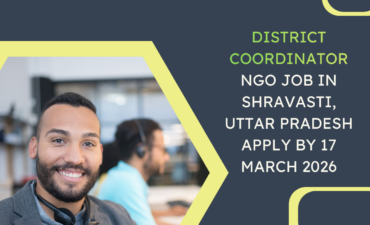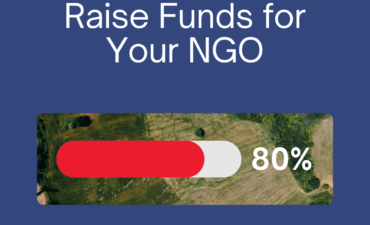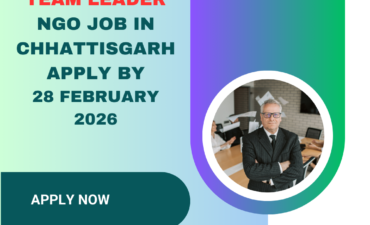Introduction: Volunteer Engagement Program for NGOs, in the dynamic landscape of social impact and community development, the role of volunteers is indispensable. NGOs play a pivotal role in addressing various societal challenges, and the success of their initiatives often relies on the dedication and passion of individuals who generously contribute their time and skills.
This comprehensive guide is designed to empower NGOs in establishing and optimizing effective Volunteer Engagement Programs. Whether you are a seasoned organization looking to enhance your existing volunteer structure or a newly established NGO seeking guidance on initiating a robust program, this resource provides valuable insights, strategies, and practical tips to help you create a vibrant and impactful volunteer community.
Volunteers are assets to any non-profit organization, and it’s a mutually beneficial relationship if leveraged properly can give desired and consistent outcomes.
Volunteers Engagement Program for NGOs, here are the pillars of creating a meaningful volunteer engagement program with likeable opportunities.
In the realm of Volunteer Engagement Programs for NGOs, the heart of success lies in the ability to create meaningful and fulfilling opportunities for volunteers. This section of the guide is dedicated to exploring the essential elements that contribute to the design and implementation of impactful volunteer roles within your organization.
Understanding Volunteer Motivations:
Before crafting volunteer opportunities, it is crucial to understand the motivations that drive individuals to contribute their time and skills. Whether driven by a passion for a particular cause, a desire for personal development, or a sense of community, recognizing these motivations allows NGOs to tailor opportunities that align with volunteers’ interests and values.
Needs Assessment and Role Design:
Conducting thorough needs assessment helps identify specific areas within your organization where volunteers can make a meaningful impact. This process involves evaluating tasks, projects, or ongoing initiatives that require additional support. Once needs are identified, designing well-defined roles with clear responsibilities ensures that volunteers understand their contribution and see the tangible results of their efforts.
Diversity and Inclusivity:
Creating meaningful opportunities goes hand in hand with promoting diversity and inclusivity within your Volunteer Engagement Program. Recognize and embrace the diverse skills, backgrounds, and perspectives that volunteers bring. Ensure that opportunities cater to a broad range of talents and interests, fostering an inclusive environment that welcomes individuals from various walks of life.
Flexibility and Personalization:
Acknowledging the diverse commitments and schedules of volunteers is essential. Design opportunities that offer flexibility, allowing volunteers to contribute in a way that suits their availability. Personalization is the key; consider tailoring roles based on individual skills and interests, maximizing the impact of each volunteer’s unique abilities.
Skill Development and Growth:
Empower volunteers not only to contribute but also to grow both personally and professionally. Design opportunities that provide skill development and training, enhancing their capabilities and fostering a sense of accomplishment. This not only benefits the volunteers but also contributes to the overall effectiveness of your organization.
Effective Communication:
Transparent and clear communication is pivotal in attracting and retaining volunteers. Clearly articulate the goals, expectations, and impact of each opportunity. Regularly update volunteers on the progress of their efforts and the overall impact of the organization. This ensures a sense of connection and satisfaction, reinforcing their commitment.
Creating meaningful volunteer opportunities is a cornerstone of a successful Volunteer Engagement Program. By aligning roles with motivations, promoting diversity, offering flexibility, and fostering growth, NGOs can cultivate a thriving community of volunteers dedicated to making a positive difference. In the subsequent sections, we will delve into strategies for recruiting, training, and retaining volunteers to further enhance the effectiveness of your program.
To begin with, let’s learn about Importance of Volunteer Engagement for NGOs as an Organizational Strategy
Volunteer engagement stands as a pivotal organizational strategy for NGOs, offering a multitude of benefits that extend far beyond the immediate impact of volunteer contributions. At its core, a robust Volunteer Engagement Program enhances an organization’s capacity to fulfill its mission by tapping into a diverse pool of talents, skills, and perspectives. Engaged volunteers serve as passionate ambassadors, amplifying the reach and impact of an NGO’s initiatives.
Moreover, the collaboration between dedicated volunteers and organizational staff fosters a sense of community and shared purpose. This not only bolsters the efficiency of day-to-day operations but also contributes to a positive organizational culture. As volunteers become deeply connected to the mission and vision of the NGO, they often evolve into long-term advocates, donors, and champions, further solidifying the organization’s sustainability and success. In essence, volunteer engagement is not merely a supplementary aspect but a strategic cornerstone that propels NGOs towards greater effectiveness, community support, and lasting positive change.
It’s important to discuss the benefits of Volunteer Engagement Program for NGOs so that non-profits can utilize the skills of volunteers to max
Volunteer engagement yields multifaceted advantages for NGOs, with a primary focus on strengthening organizational capacity and fostering a sense of community. Leveraging diverse skill sets is a key aspect, as engaged volunteers bring a range of talents and expertise that can significantly enhance an organization’s ability to address challenges and achieve its goals.
Moreover, the increased availability of resources, both in terms of manpower and specialized skills, expands an NGO’s operational capacity. On the community front, volunteer engagement fosters a shared vision among individuals dedicated to a common cause, creating a cohesive and motivated collective.
This shared purpose not only enhances organizational culture but also forms the basis for a vibrant and supportive community. Ultimately, the benefits of volunteer engagement extend beyond immediate tasks, playing a transformative role in bolstering an NGO’s resilience, innovation, and overall impact.
First Learn about how to select Volunteers for Volunteer Engagement Program for NGO
Selecting volunteers for NGOs involves a strategic process of identifying individuals whose skills, passion, and commitment align with the organization’s mission.
This includes defining specific volunteer roles, outlining the required skills, and utilizing targeted recruitment channels.
Engaging in thorough interviews and reference checks helps assess candidates’ suitability, while considering their alignment with organizational values and goals.
A transparent selection process ensures that chosen volunteers contribute effectively to the NGO’s initiatives, fostering a dedicated and impactful volunteer community.
The Key Here Is To Know How to Design a Volunteer Engagement Program for NGOs that is strategic and impactful at the same time
Designing an effective Volunteer Engagement Program is a strategic process that hinges on the clear development of objectives and the structured implementation of collaborative initiatives.
To begin, it is crucial to define organizational goals, ensuring that the volunteer program aligns seamlessly with the broader mission and objectives of the NGO.
This entails a careful assessment of specific needs and areas where volunteer support can make a meaningful impact. Collaborative initiatives are then structured by involving organizational staff in the development process, tapping into their insights and expertise.
Furthermore, tailoring volunteer opportunities to the specific needs of the community ensures that the program is responsive and impactful.
By developing clear objectives and fostering collaboration, organizations can design a Volunteer Engagement Program that not only aligns with their mission but also addresses community needs in a strategic and effective manner.
Now Let’s Look at the Key Components of Effective Volunteer Engagement Program for NGOs
Let’s delve into the key components of an effective Volunteer Engagement Program for NGOs. Strategic recruitment is paramount, involving the identification of target volunteers and aligning their skills with organizational needs to ensure a tailored and impactful collaboration.
Comprehensive training and orientation follow, encompassing skill development programs that enhance volunteers’ capabilities and building familiarity with the organization’s mission.
By strategically recruiting and equipping volunteers through targeted training, NGOs can create a dynamic and aligned Volunteer Engagement Program that maximizes impact and promotes a shared commitment to the organization’s mission.
How to Implement and Assign Tasks under the Volunteers Engagement Program
Task assignment and project matching are critical elements in the volunteer engagement process for NGOs.
To optimize the impact of volunteers, it is essential to carefully align their skills, interests, and capabilities with specific tasks or projects within the organization.
This involves a systematic approach of evaluating individual strengths, project requirements, and organizational needs.
Effective task assignment ensures that volunteers are placed where their contributions can make the most significant difference, promoting a sense of fulfillment and maximizing the overall success of the NGO’s initiatives.
Under the Volunteers Engagement Program for NGOs it is Crucial to Creating a Positive Volunteer Experience so that you keep them pleased and contented
Creating a positive volunteer experience is essential for the success of any Volunteer Engagement Program. It involves crafting an environment that fosters satisfaction, fulfillment, and a sense of purpose for volunteers.
This encompasses clear communication, recognition of contributions, and ensuring that volunteers feel valued and connected to the organization’s mission.
By prioritizing a positive experience, NGOs can not only retain dedicated volunteers but also inspire lasting commitment and enthusiasm, ultimately contributing to the overall success of the organization’s initiatives.
Create a Positive Experience, under the Volunteer Engagement Program for NGOs
Many non profits under the Volunteer Engagement Program for NGOs provide a lot of benefits like free of cost trainings, incentives and for outstation volunteers they provide them with a rent free living space and free food.
Beside all these it is of utmost important to give praise and recognition, these are foundational elements in creating a positive volunteer experience. Acknowledging the efforts and contributions of volunteers is vital for fostering a sense of value and motivation.
NGOs can implement various recognition strategies, such as public acknowledgement, awards, or personalised expressions of gratitude.
Timely and genuine appreciation reinforces the significance of volunteers’ work, cultivating a positive atmosphere and encouraging continued engagement.
By prioritizing recognition and appreciation, organizations not only honor the dedication of their volunteers but also solidify a culture of mutual respect and gratitude within the Volunteer Engagement Program.
Overcoming Challenges in Volunteer Engagement Program for NGOs
Addressing challenges in volunteer engagement is crucial for the sustained success of any program. This section explores strategies to navigate common obstacles, such as recruitment difficulties, maintaining volunteer motivation, and ensuring effective communication.
By proactively identifying and overcoming these challenges, NGOs can optimize their Volunteer Engagement Programs, fostering resilience and maximizing the positive impact of their volunteers.
It is also important to Measure Impact and Continuous Improvement of Volunteers Engagement Program for NGOs in a selected timeline
To gauge the effectiveness of a Volunteer Engagement Program, establishing Key Performance Indicators (KPIs) is essential.
This involves both quantitative metrics, such as the number of volunteer hours contributed or specific project outcomes, and qualitative assessments, which capture the broader impact on the community and volunteers’ experiences.
By regularly evaluating these indicators, NGOs can measure the success of their programs and identify areas for improvement. This commitment to measurement and continuous improvement ensures that Volunteer Engagement Programs remain dynamic, responsive, and aligned with organizational goals over time.
It is recommended to assess the performance on a Quarterly basis so that a feedback loop and improvisation is timely done.
In conclusion, a well-crafted Volunteer Engagement Program is not just a supportive framework for NGOs; it is the lifeblood that propels organizations toward their missions.
From strategic recruitment and comprehensive training to fostering a positive volunteer experience, each component plays a pivotal role in cultivating a thriving community dedicated to positive change.
Recognizing the challenges and measuring impact underscore the need for continuous improvement. As NGOs embark on this journey, let the essence of meaningful opportunities and the importance of community echo — for in the collaborative efforts of passionate volunteers lies the transformative power to create lasting impact and build a better world.
Related Good Reads, Link
Hey, STEAL our Best Premium Content For Absolutely Free, Check Out the Links below
HOPE these will add value to your existing skills and knowledge
Our information bears no cost (it’s absolutely FREE), don’t let valuable information slip away.
Join our community of avid readers who are always in the know. Subscribe to our website; stay connected and engaged with the latest news, trends, and developments by subscribing today.
(PUSH the bell ICON)
Leverage the power of knowledge to propel your organization to new heights. Don’t miss out to explore our content
- Latest Funds for NGOs,
- NGO Jobs
- Resources (Helpful Guides and Courses)
- Premium Resources
- NGO related articles
Empowering Humanity through Funds, Resources and Collective Action
Sharing is Appreciated









